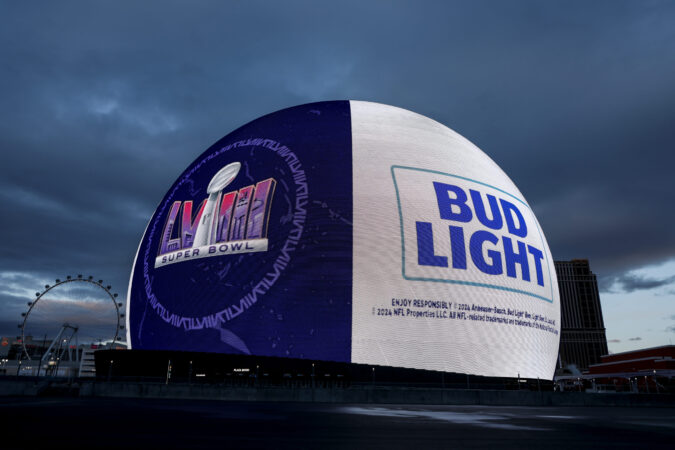Though the San Francisco 49ers came up short at Super Bowl LVIII, losing to the Kansas City Chiefs 25-22, their defeat on Feb. 11 pales in comparison to the one suffered by Bud Light during the weeks surrounding the big game.
This year’s Super Bowl achieved record viewership numbers, but beer sales declined 5.3% overall for the two weeks ending on Feb. 17 compared to the same period in 2023, according to data compiled by Bum Williams Consulting and reported by The Wall Street Journal (WSJ). Bud Light sales alone plunged a catastrophic 30.1% compared to last year. Its sister brands Budweiser, Busch Light, and Michelob Ultra fared little better, experiencing drops of 17.7%, 7.2%, and 3.1%, respectively.
The brand experienced disastrous sales numbers after the Super Bowl despite a massive ad campaign during the game itself, featuring NFL legend Peyton Manning and musician Post Malone, the WSJ noted.
Meanwhile, rival brands Miller Lite and Coors Lite (both owned by parent company Molson-Coors) cashed in, with the latter seeing a nearly 10% increase in sales while the former saw a more modest 5% bump.
Modelo Especial also saw a 6.9% increase in sales and continued its streak as the nation’s favorite beer since it dethroned Bud Light back in May. Modelo as well as Corona are owned by the same company that owns Bud Light, but the U.S. distribution rights are owned by the Chicago-based Constellation Brands as a result of an antitrust lawsuit in 2013.
That Super Bowl slump isn’t even the latest bad news for Bud Light. In fact, it’s been a rough year for the formerly beloved beer brand after its parent company, Anheuser-Busch, decided to partner with trans-identifying influencer Dylan Mulvaney in the spring of 2023.
According to the fourth quarter earnings report that came out Thursday, AB InBev (the company that owns Anheuser-Busch) lost up to $1.4 billion last year due to the firestorm of controversy that surrounded its Mulvaney partnership. The company identified the U.S. market in particular as the source of the massive loss, claiming its growth “was constrained by the performance of our US business.”
“Revenue declined by 17.3% with sales-to-retailers (STRs) down by 12.1%, primarily due to the volume decline of Bud Light. Sales-to-wholesalers (STWs) declined by 16.1% as shipments lagged stronger depletions in December,” the company’s report said.
CLICK HERE TO GET THE DAILYWIRE+ APP
AB InBev CEO Michel Doukeris told investors that the company was recovering from its losses, but only at a glacial pace — about 0.1 to 0.2 percentage points every 3 to 4 weeks. From May 2023 to February 2024, Bud Light had regained only 1.2 points of its lost market share, according to CNN.
Mulvaney had first promoted Bud Light in a video of himself drinking the beverage in a bathtub on Feb. 11, 2023, but the backlash didn’t truly erupt until Mulvaney posted a second video for March Madness.
In the April 1 video, Mulvaney, infamous for a series of videos chronicling his transition called “Days of Girlhood,” showed off a can of the light beer with his face on it. A few days later, Bud Light confirmed that it had indeed signed a brand partnership deal with Mulvaney in an effort to “authentically connect with audiences.”
Bud Light tried to excuse the partnership as just one of dozens it maintains with influencers around the world and noted that the Mulvaney-themed can was not for sale to the general public, but the firestorm had already been unleashed. Almost overnight, a beer brand widely regarded as a blue-collar American beverage became anathema among conservatives.
In the first week of the controversy, Bud Light sales decreased 11%, and its stock plunged 20% by the beginning of June, losing Anheuser-Busch billions in market value. Also in June, Bud Light lost its place as the best-selling beer in America to Modelo Especial. Anheuser-Busch’s overall U.S. revenue was down 10.5% in the 2nd quarter of 2023 (April-June) compared to the same period in 2022, and the company’s sales to U.S. retailers fell 14% by early August. The company lost nearly $400 million in revenue during the 2nd quarter alone.
The 3rd quarter (July-September) of 2023 was even worse for the company, which reported a 13.5% drop in revenue per 100 liters, according to CNN, while sales to American retailers decreased 17% in the same period.
In response to the backlash, the beer industry’s self-regulating body, the Beer Institute, revised its ad standards and added new language regarding brewers’ partnerships with social media influencers. Under the new standards, Mulvaney would not be an acceptable partner for a beer company because of the high percentage of his audience that is under the legal drinking age.
Prior to its Super Bowl LVIII ad campaign, Bud Light released patriotic-themed ads that emphasized the company’s American roots and even released camo and Harley Davidson cans to try to win back disgruntled consumers, to no avail. Anheuser-Busch’s CEO, Brendan Whitworth, was roundly criticized for a statement he made two weeks after the controversy began that failed to make mention of Mulvaney, transgenderism — or offer an apology to offended customers.
It’s been a rough year for Bud Light, and despite the brand’s best efforts it hasn’t been able to recapture its old market share or mollify the anger of conservative customers. The Super Bowl weekend, instead of the nice boost in sales it usually represents, instead crowned nearly a year of financial disaster for Anheuser-Busch.
Bud Light has tried everything from celebrity cameos to pandering, nostalgia-laden commercials to practically giving away free beer, and it has so far failed to bring people back to what was once America’s favorite beer. Without a genuine redress of grievances from the executives at Bud Light, the brand may not see the end of this long, financially painful road in 2024.

